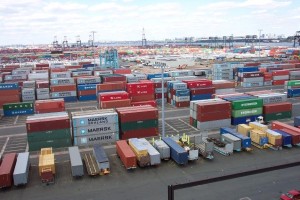By Bolaji Akinola
Last year was bad for the operations of shipping lines and port operators but this year has been worse. Whilst the slowdown in the shipping business, as with the oil and gas industry, is an evolving global trend for which many ‘experts’ have failed to offer plausible explanation; the peculiar political and economic turmoil beleaguering Nigeria since 2014 has posed more daunting challenges for operators in both sectors in the country.
There has not been any major investment in Nigeria since 2014 largely due to the impending 2015 general elections. The uncertainty surrounding possible outcome of the election created the investor lethargy of 2014. The reluctance of investors to undertake long-term commitments became more pronounced in the first half of 2015. However, with successful conduct of the presidential elections, hopes of a quick recovery and return of investors became high. Economic theorists projected three-month recovery period but as it turned out, they were dead wrong. The government of the day was content chasing stolen wealth rather than creating new values. The uncertainty in the operating environment fuelled by lack of policy direction from the new government has negatively impacted the maritime business both on the seaside and the landside.
Several shipping lines have stopped plying the Nigerian route as a result of pathetically low volumes and declining freight rates. 2016 has seen continued hardship for shipping lines across both dry and wet cargo carriers. Confidence in the shipping sector is at its lowest since 2008.
Nippon Yusen Kaisha popularly known as NYK Lines was the first to withdraw from the Nigerian route in the last quarter of 2015 due to growing losses as a result of the twin jeopardy of low freight rates and declining volumes. The top Japanese shipping line had operated the Asia-West Africa service, which it dubbed WAX, together with Hapag-Lloyd and Gold Star Line (GSL). The service featured two calls to Nigeria – Lagos-Apapa and Lagos-Tincan.
Taiwan’s Evergreen Line followed suit with the withdrawal of its vessels from the Asia-West Africa route, which had regular calls at the Lagos Port Complex Apapa.
“After three years of serving the market (in Nigeria), Evergreen decided to discontinue their service (WA1) due to losses sustained from widening disparity between rate levels and costs. Rate levels especially from Asia have fallen over 50% in the period with the cost levels remaining disproportionate,” the line’s agents in Nigeria had been quoted as saying.
Messina Line also withdrew from the Nigeria route for the same reasons of widening operating losses. Even the big operators who have managed to absorb the widening losses due to their strong balance sheets, have trimmed their services. Notwithstanding, more lines will quit the Nigeria route as container volumes continue to fall, resulting in reduced vessel load factors and declining freight rates.
Data from Container Trades Statistics shows that southbound volumes from Asia to West Africa decreased in nine of the first ten months of 2015; compared with the previous year, with the most recent year-on-year declines reaching 10%.
The uninspiring demand in trade has forced carriers to limit any growth in capacity as utilization levels on ships plying the once boisterous and lucrative route stand at a gloomy 57% for inbound voyages and less than 20% for the outbound leg. Spot freight rates to Nigeria have also plunged to an all time low of less that USD1,000 for a TEU. This is in the region of half of its 2013 value.
On the port side, operators have lost 50% of their cargo volume year-on-year. RORO operators have fared worse with a 70% loss of volume.
Traditionally the last quarter is one of the strongest periods of the year for shipping and port activities but this year is different. The empty roads around the port area in Apapa, Port Harcourt and Onne attest to this. Typically at this time of the year, these port communities would be experiencing gridlocks but alas, the cargoes have disappeared.
As tough as this situation is for shipping lines, terminal operators and other players in the maritime industry, government appears unperturbed. Most Nigerians also fail to appreciate the enormity of the challenges the sector is going through at this time.
Copyright Ships & Ports Ltd. Permission to use quotations from this article is granted subject to appropriate credit given to www.shipsandports.com.ng as the source.
